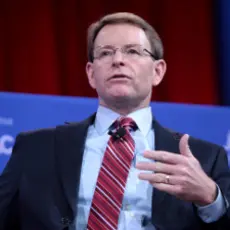In the weeks leading up to the midterm elections, religious-right leaders incorporated more and more of the Republican Party platform into their definition of the “values voter,” beyond their traditional wedge issues to tax and pension policy and strategies for the war on terror. But at least one movement stalwart has been increasingly critical of religious-right activists’ dedication to partisan politics.
Ken Connor, as former president of the Family Research Council and lawyer for Florida Republicans during the Terri Schiavo event, is no slouch when it comes to staunch advocacy of far-right positions. But when the Republicans in the House sped through a largely symbolic “values agenda” this summer, Connor called the voters “lip service” to “animate ‘values voters’ right before the election.” While current FRC President Tony Perkins touted the legislative effort as a victory, Connor wrote that Republicans “know perfectly well that many ‘values voters’ find it difficult to vote for Democrats, so they do the absolute minimum necessary to win us over and then largely forget us until the next campaign season.”
And in August, Connor similarly dismissed the doomed vote on a constitutional amendment to ban gay marriage, calling it “little more than a cynical ploy.” He wrote, “Republican leaders knew the measure had no chance of passage and did precious little to make it pass. That they couldn't even muster majority support in the Republican-controlled Senate is evidence of just how anemic their efforts really were. Eyewash is not a substitute for the real thing.” A Christianity Today article suggested that the Religious Right’s move to concentrate on the proposed federal amendment, which he said has little chance of passing, was the cause of his resigning from the FRC in 2003.
Responding to Tuesday’s election results, Connor bemoans not only that “the party that identified itself as the defender of ‘traditional values’ became synonymous with corruption and scandal” and that “Republican leaders seemed to think of social conservatives as easy dupes,” but also that religious-right activists happily went along with the GOP program:
Unfortunately, it is clear that Christian conservative leaders contributed to the Republican defeat, and in the process they've lost credibility. When Tom DeLay's excesses were exposed, Christian political groups closed ranks to support him. When congressional Republicans put on their phony legislative parade, Christian political leaders were willing accomplices. When the Mark Foley scandal hit, Christian groups faulted everyone but Republican leaders.
Why have prominent Christian organizations and leaders behaved in this way? The sad reality is that many have been seduced by the Washington, D.C., political culture. …
Even worse than political failure, however, is moral failure. The week after an election is always a time for reflection and soul searching. As Christians engaged in the public square, let us use this time to examine our own consciences. Why are we involved in politics? Is it to fight for justice, stand on principle, and give voice to the voiceless, or is it to deliver votes for the GOP every other year? Are we called to be faithful, or politically expedient? Have we defended and excused wrong doing and wrong doers for the sake of our honorable goals? Are we more concerned with the opinion of "our guys" in Washington, D.C., or with our God in Heaven?






